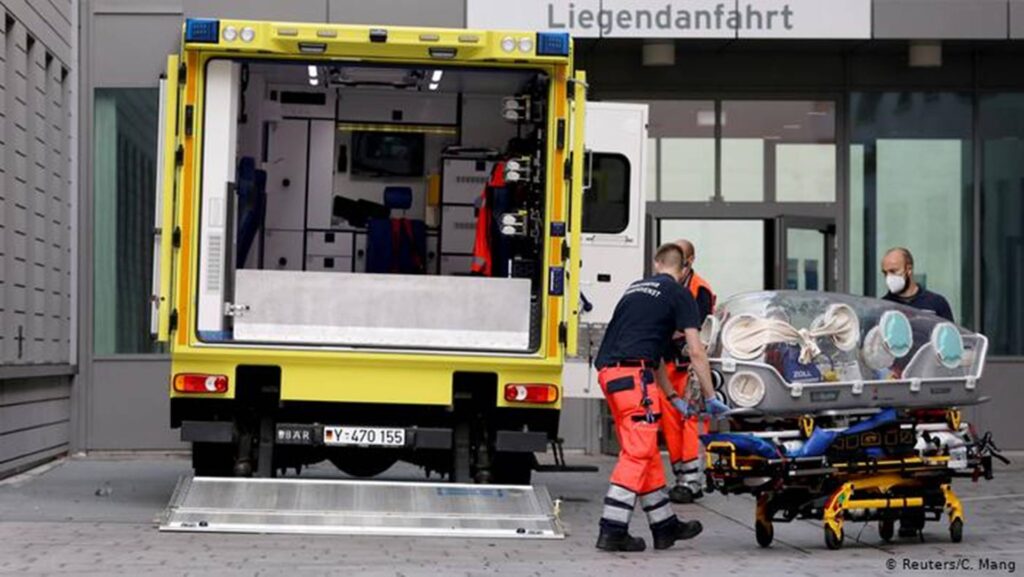The Charite university hospital treating Alexei Navalny in Berlin says early tests suggest he was poisoned by a toxin. Angela Merkel urged authorities in Russia to carry out a detailed and transparent investigation.
Berlin Charite hospital said in a statement on Monday that its data indicated Alexei Navalny was probably intoxicated by a substance in the cholinesterase inhibitors group of chemicals, but that it had not yet identified a precise substance.
The effects of such a chemical on Navalny had been “shown several times and in separate laboratories,” the hospital said. Cholinesterase inhibitors are found in several drugs, but also pesticides and nerve agents.
BREAKING from Charité hospital treating Alexei Navalny:
– Clinical evidence points to poisoning with a “cholinesterase inhibitor”
– Navalny remains in an induced coma
– Condition serious but his life not currently in acute danger pic.twitter.com/Nnl5M6uBSh— Richard Walker (@rbsw) August 24, 2020
Navalny, a fierce critic of Russian President Vladimir Putin, was flown to Berlin on Saturday via a German-operated flight to receive treatment and has been in a coma for several days.
”The patient is in an intensive care unit and is still in an induced coma. His health is serious but there is currently no acute danger to his life,” Charite hospital said. Doctors are currently treating Navalny with the antidote atropine.
But doubts remain about the 44-year-old’s health in the future. “The outcome of the disease remains uncertain and after effects, especially in the area of the nervous system, cannot be excluded at this time,” the hospital statement read.
Russian dissident Alexei Navalny arrives in Berlin for medical treatment
Under police protection
Earlier on Monday, the German government had said that Navalny was likely poisoned and confirmed that he was under police protection. ”It was obvious that after his arrival, protective precautions had to be taken,” Merkel’s spokesman, Steffen Seibert said.
Berlin police and federal agents are both providing security for the Russian opposition figure at Charite hospital, which is located in downtown Berlin.
The government of Russia has not yet commented on the Navalny’s health status or allegations that he was poisoned made prior to Charite’s statement.
Russian doctors on Monday said two laboratories found no poisonous substances in his system. ”If we had found poisoning confirmed by something, it would have been much easier for us,” said Anatoly Kalinichecnko, deputy chief doctor of the Omsk Ambulance Hospital No. 1, where Navalny was initially treated.
The hospital’s chief doctor, Alexander Murakhovsky, has denied allegations that doctors in Omsk may have been acting in coordination with Russia’s security services to keep the poisoning hidden.
Merkel calls for accountability
In a joint statement with Foreign Minister Heiko Maas, Chancellor Angela Merkel said the Charite hospital findings merited a full investigation by local authorities in Russia.
“In view of the prominent role of Mr. Navalny in Russia’s political opposition, there’s an urgent call on local authorities to investigate this crime to the last detail, and to do so in full transparency,” Merkel and Maas said. “Those responsible must be identified and held accountable.”
EU High Representative Josep Borrell said it was “imperative” for Russian authorities to launch an “independent and transparent investigation.”
Jurgen Trittin, Greens party member the Bundestag’s foreign affairs committee, told DW that this was not the first time that political figures in Russia were victims of poisonings, in particular those who opponents of Putin.
Trittin said it was not clear who was behind Navalny’s poisoning, but called it “an embarrassment” for President Putin. “He is not able to protect people who are not on the same line as he is,” the Greens politician said.
“If he is not behind that assault, he is not able to avoid such assaults,” Trittin said, adding that an attack on a Russian dissident had even taken place on German soil, when a Chechen man was killed in broad daylight in a park by suspected Russian agents.
“We have to be clear that those practices, assaults with poison, killers in our countries, cannot be accepted and is not a basis for bilateral relations between Russia and the European Union,” Trittin said, when asked how Germany should respond to Navalny’s poisoning. “I think we should react as Europeans. This is not a German question. It’s a question of the whole Europe.”
DW / Balkantimes.press
